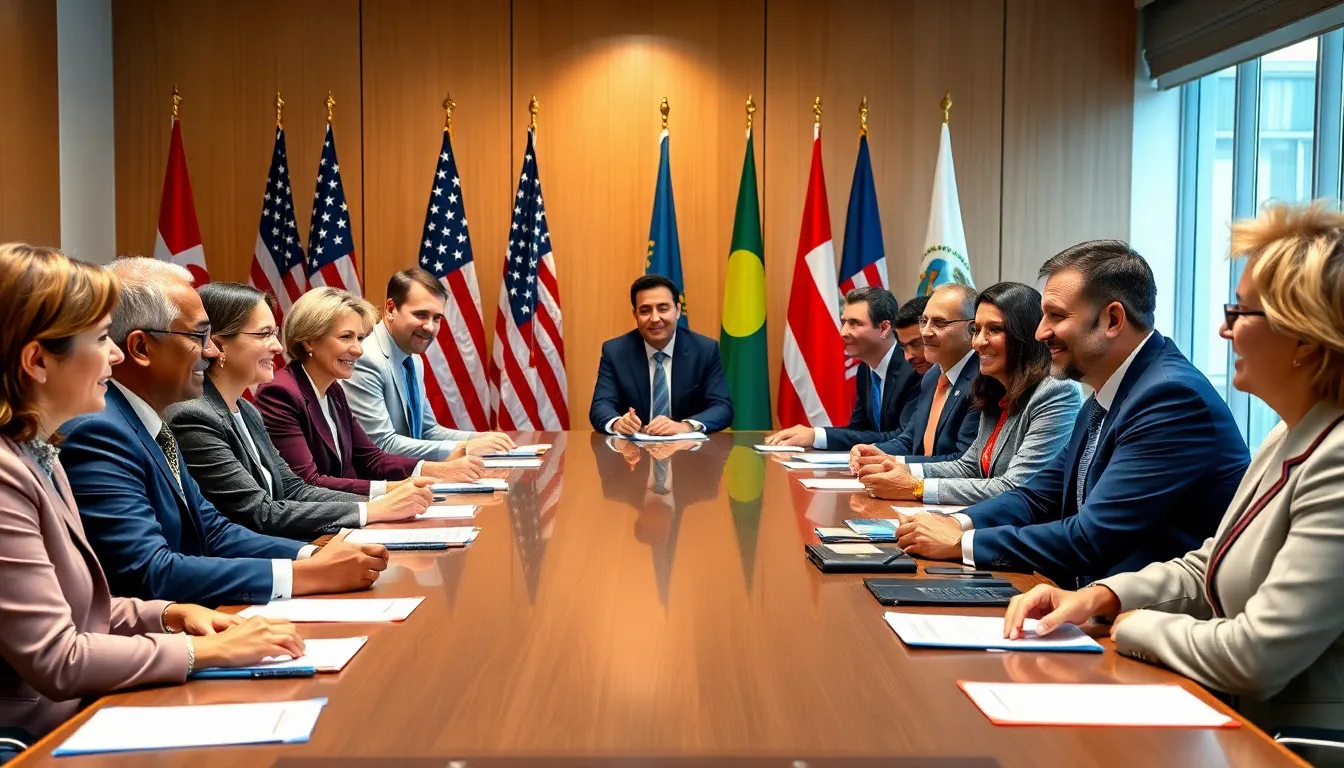In an increasingly interconnected world, the need for effective international cooperation strategies has never been more critical. Nations face complex challenges that transcend borders, from climate change to economic instability. These issues demand collaborative efforts, innovative solutions, and a commitment to shared goals.
An effective international cooperation strategy not only strengthens diplomatic ties but also fosters economic growth and enhances global security. By aligning interests and pooling resources, countries can tackle pressing global challenges more efficiently. As nations navigate this intricate landscape, understanding the nuances of cooperation becomes essential for sustainable development and peace.
Table of Contents
ToggleOverview of International Cooperation Strategy
International cooperation strategies focus on fostering collaborative efforts among nations to address global challenges. These strategies emphasize mutual interests and shared goals in areas such as climate change, economic stability, and security enhancement.
Countries often engage in multilateral agreements that lay the groundwork for joint actions. These agreements facilitate communication, resource sharing, and coordinated responses to crises. For example, international climate accords aim to unite nations in reducing greenhouse gas emissions, aiming for a sustainable future.
Resource pooling enhances capacity to tackle large-scale issues. Collaborative research and development projects often emerge in technology, health, and environmental sectors, leading to innovative solutions. Countries share knowledge and expertise, resulting in improved outcomes that benefit all parties involved.
Developing diplomatic relations plays a crucial role in successful international cooperation strategies. Countries recognize that fostering trust and understanding leads to more effective collaborations. Enhanced diplomatic channels enable conflict resolution and stronger partnerships.
Monitoring and evaluation mechanisms ensure strategies remain effective. Regular assessments of progress allow nations to adapt and modify approaches as needed. This adaptability supports long-term goals, fostering resilience against evolving global challenges.
Key Principles of International Cooperation

International cooperation hinges on several key principles that guide effective collaboration among nations. Understanding these principles ensures countries can work together efficiently to address global challenges.
Mutual Benefit and Win-Win Approach
Mutual benefit drives successful international cooperation. Countries engage in partnerships where all involved parties gain from the collaboration. This creates an environment conducive to trust and long-term relationships. For example, trade agreements often emphasize win-win scenarios, allowing nations to bolster their economies while catering to each other’s needs. Collaborative efforts in areas such as technology transfer or joint research projects exemplify this principle, where shared advancements lead to collective growth and innovation.
Respect for Sovereignty
Respect for sovereignty remains a cornerstone of international cooperation. Each nation possesses the right to govern itself and make independent decisions. Acknowledging this principle fosters a respectful atmosphere in negotiations and partnerships. For instance, multilateral agreements often include provisions that honor member states’ autonomy while promoting shared goals. By ensuring that cooperations do not infringe upon national interests, countries can build stronger partnerships grounded in mutual respect, facilitating effective collaboration on common issues.
Major Players in International Cooperation
International cooperation involves a variety of entities that contribute to collaborative efforts. These players work together to address global challenges effectively.
Governmental Organizations
Governmental organizations play a pivotal role in international cooperation. They establish policies and frameworks for collaboration among nations. Examples include:
- United Nations (UN): Facilitates dialogue and coordination among member states on global issues like peace and security, human rights, and sustainable development.
- World Trade Organization (WTO): Aims to create a fair global trading environment, promoting trade agreements that benefit member countries.
- European Union (EU): Promotes economic and political integration among European states, strengthening cooperation through shared policies and legislation.
Governmental organizations help unify nations under common goals, ensuring coordinated responses to international crises.
Non-Governmental Organizations
Non-governmental organizations (NGOs) also significantly contribute to international cooperation. They bridge gaps between governments and communities, fostering grassroots initiatives. Examples include:
- International Red Cross: Provides humanitarian aid and disaster relief, often collaborating with governments to deliver assistance efficiently.
- Greenpeace: Advocates for environmental protection and sustainable practices, often engaging with governments to promote policy changes.
- Oxfam: Focuses on alleviating poverty and social injustice, collaborating with local communities and governments on development programs.
NGOs enhance the effectiveness of international cooperation by bringing diverse perspectives and expertise, addressing issues at the community level.
Challenges in Implementing International Cooperation
International cooperation faces numerous challenges that can hinder its effectiveness. Political and economic barriers, along with cultural differences, present significant obstacles that require strategic attention.
Political and Economic Barriers
Political and economic barriers manifest through divergent national interests and competing agendas. Nations often prioritize their own economic stability and political security over global collaboration. Political instability can also undermine trust, leading to reluctance in forming alliances. Economic disparities among nations influence negotiations, as wealthier countries may leverage their resources for favorable terms, creating imbalances in partnerships. For example, trade agreements may favor developed nations, limiting the benefits for developing counterparts. Moreover, inconsistent policies or changes in leadership may disrupt continuity in international initiatives, leading to fragmented cooperation efforts.
Cultural Differences
Cultural differences impede effective communication and understanding among nations. Language barriers often complicate negotiations, creating misunderstandings and misinterpretations. Variations in cultural practices, values, and social norms can lead to conflicting perceptions of cooperation. For instance, some cultures may emphasize individualism, while others prioritize collectivism. These differences can affect decision-making processes and partnership dynamics. Furthermore, preconceived stereotypes and historical grievances may hinder the establishment of trust, making it challenging to foster long-term cooperative relationships. Addressing these cultural nuances is essential for building effective international cooperation strategies.
Successful Case Studies
Successful international cooperation strategies exemplify the potential of collaborative efforts in addressing global challenges. Significant case studies illustrate effective partnerships among nations.
The Paris Agreement
The Paris Agreement represents a milestone in global climate action. Adopted in 2015, it unites 196 countries in a commitment to limit global warming to well below 2 degrees Celsius. Countries submit Nationally Determined Contributions (NDCs) to outline their carbon reduction goals. This collaborative framework promotes transparency and accountability, encouraging nations to enhance their commitments over time.
The Global Health Security Agenda (GHSA)
The Global Health Security Agenda (GHSA) focuses on strengthening national capacities to prevent, detect, and respond to infectious disease threats. Launched in 2014, GHSA includes partnerships from over 60 countries, international organizations, and civil society groups. Collaborative efforts have led to improved health systems and better preparedness against outbreaks, exemplified by coordinated responses during the Ebola virus outbreak in West Africa.
The World Trade Organization (WTO)
The World Trade Organization (WTO) facilitates multilateral trade agreements that enhance economic cooperation among member nations. Through negotiations and dispute resolution mechanisms, the WTO promotes fair trade practices and helps reduce trade barriers. The organization’s role in recent trade agreements demonstrates its importance in fostering economic stability and collaboration, especially in times of economic uncertainty.
The United Nations Sustainable Development Goals (SDGs)
The United Nations Sustainable Development Goals (SDGs), established in 2015, provide a universal framework for cooperation toward sustainable development. The 17 goals set targets for various global challenges, such as poverty, education, and climate action, promoting collaborative efforts across countries. Nations share knowledge and resources to achieve these goals, demonstrating the power of collective action.
The Comprehensive and Progressive Agreement for Trans-Pacific Partnership (CPTPP)
The CPTPP is a trade agreement between 11 countries across the Asia-Pacific region, emphasizing economic cooperation. It reduces tariffs and promotes trade liberalization among member states. The CPTPP’s framework fosters cooperation by creating shared economic benefits while allowing countries to pursue individual development priorities.
The African Union (AU)
The African Union (AU) fosters regional collaboration among African nations, emphasizing peace, security, and development. Initiatives such as the African Continental Free Trade Area (AfCFTA) aim to boost intra-African trade by eliminating tariffs and harmonizing trade regulations. The AU exemplifies effective cooperation in addressing continental challenges, fostering stability, and enhancing economic integration.
Through these case studies, it’s clear that successful international cooperation strategies lead to meaningful progress in addressing global challenges. These examples provide valuable insights into best practices for enhancing collaboration among nations.
Future Directions for International Cooperation Strategy
Future directions for international cooperation strategy emphasize the need for adaptive frameworks that respond to emerging global challenges. Countries must prioritize flexibility and innovation in their policies to navigate issues such as technological advancements, health crises, and environmental degradation.
- Technology Integration: Nations are incorporating technology into cooperation strategies. Utilizing data analytics enhances decision-making processes, improving responses to crises. Countries sharing best practices in technology address cybersecurity threats, facilitating collaborative tech initiatives.
- Sustainability Focus: Emphasizing sustainability ensures economic growth aligns with environmental goals. Countries collaborating on green technologies can lead efforts to combat climate change. Multinational projects aimed at renewable energy sources enhance resource sharing and innovation.
- Inclusive Governance: Nations need inclusive governance models that consider diverse stakeholder input. Engaging citizens, businesses, and NGOs in policy discussions fosters trust and ensures comprehensive approaches to global issues. Inclusive participation enhances legitimacy and effectiveness in cooperation efforts.
- Regional Collaborations: Strengthening regional alliances boosts collective capabilities. Countries forming regional partnerships can address localized challenges while enhancing security. Collaborative regional initiatives, such as joint border patrols or trade agreements, contribute to stability and economic development.
- Crisis Preparedness and Response: Enhancing crisis preparedness remains vital. Nations must establish shared protocols to respond to pandemics and natural disasters. Coordinated disaster response frameworks enable countries to offer timely assistance and streamline resource distribution.
- Cultural Competence: Understanding cultural contexts is crucial for effective cooperation. Nations fostering cultural competence develop more meaningful partnerships and enhance communication. Training programs that promote cross-cultural understanding will facilitate negotiations and reduce misunderstandings.
- Monitoring and Feedback Mechanisms: Implementing robust monitoring and feedback systems ensures transparency and accountability in international cooperation. Nations will adapt strategies based on evaluation results, promoting continuous improvement in collaborative initiatives.
Adopting these future directions positions nations to tackle complex global challenges more effectively, benefiting all parties involved.
Effective international cooperation strategies are vital for navigating today’s complex global landscape. By fostering collaboration among nations, countries can enhance their capacity to address pressing challenges like climate change and economic instability. The emphasis on mutual benefit and respect for sovereignty creates a foundation for trust and long-term partnerships.
As nations adapt to emerging issues, the integration of technology and inclusive governance will be crucial. Strengthening regional collaborations and enhancing crisis preparedness can significantly bolster collective security. With robust monitoring and evaluation mechanisms in place, nations can ensure transparency and accountability in their cooperative efforts. These strategies not only promote sustainable development but also pave the way for a more resilient and interconnected world.



